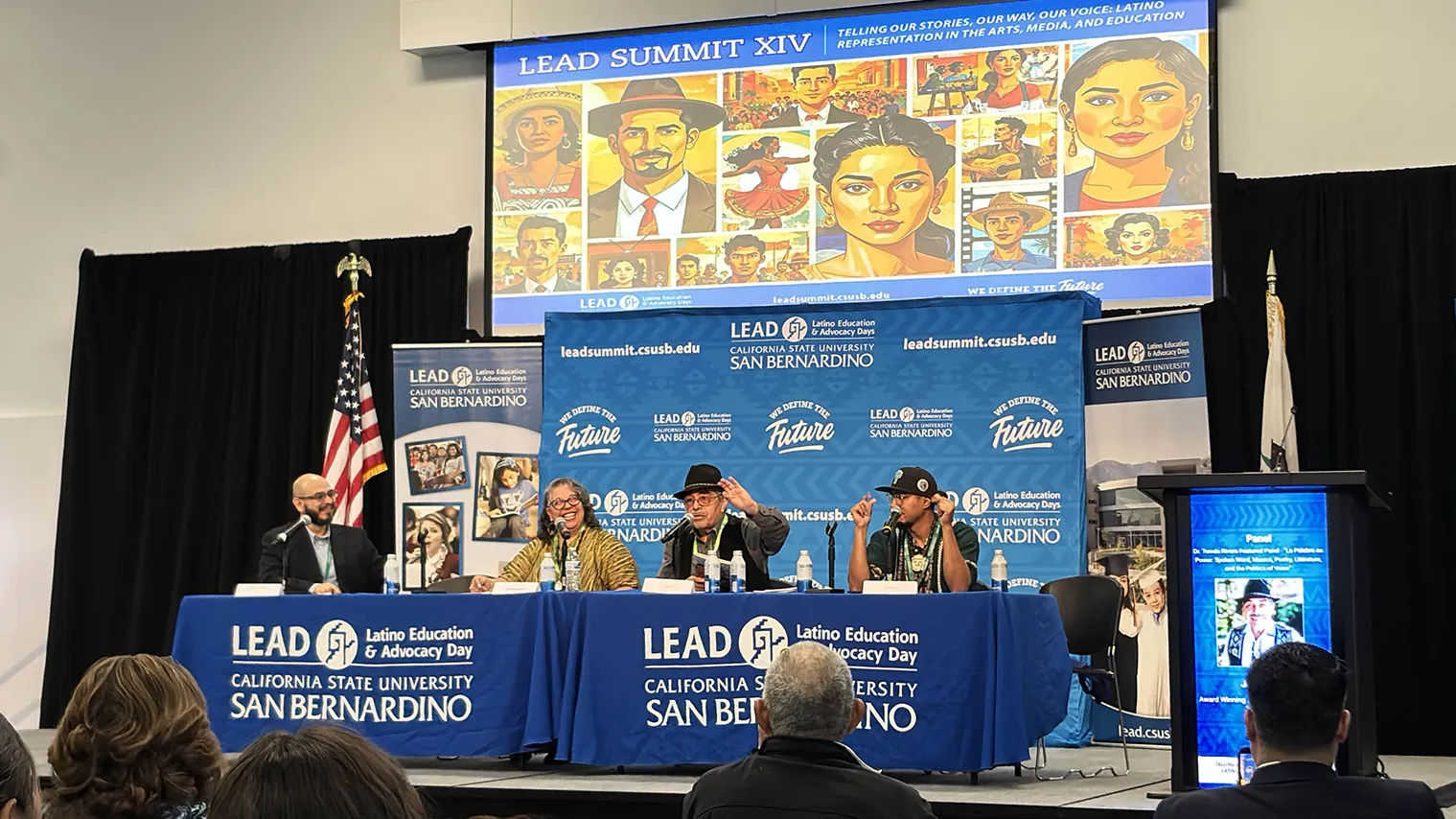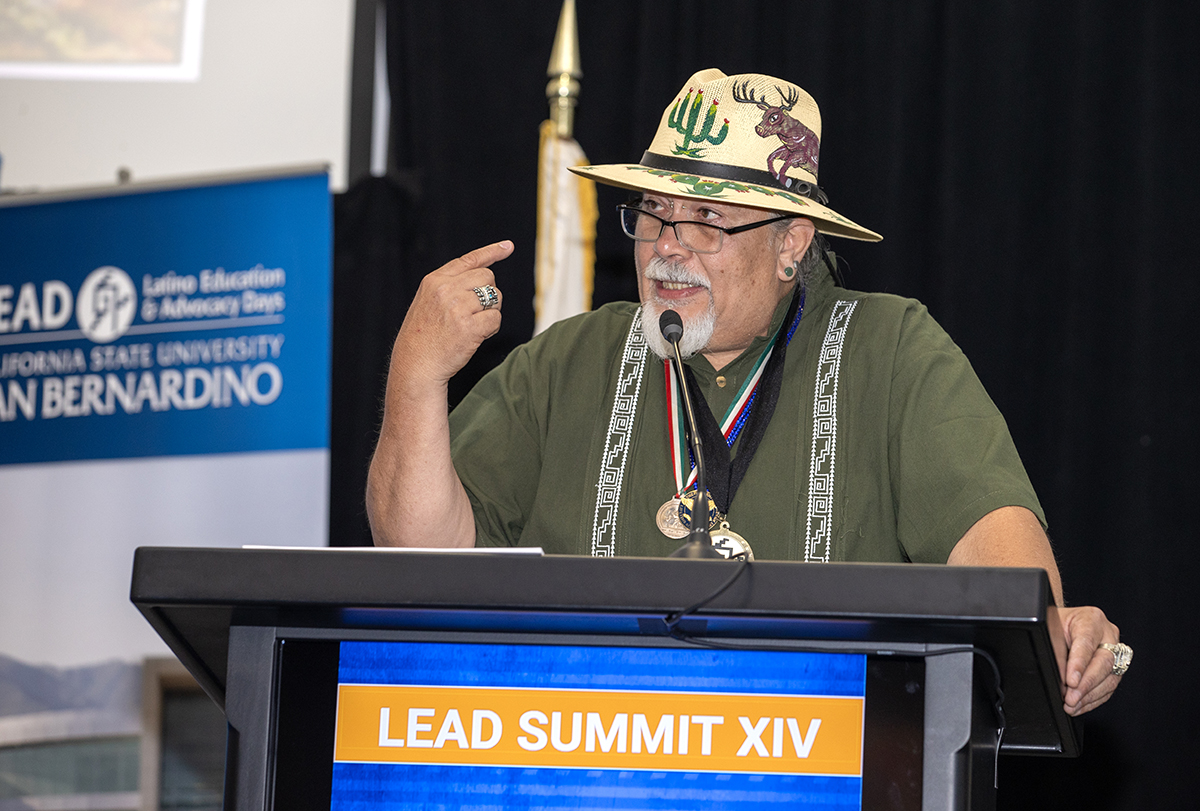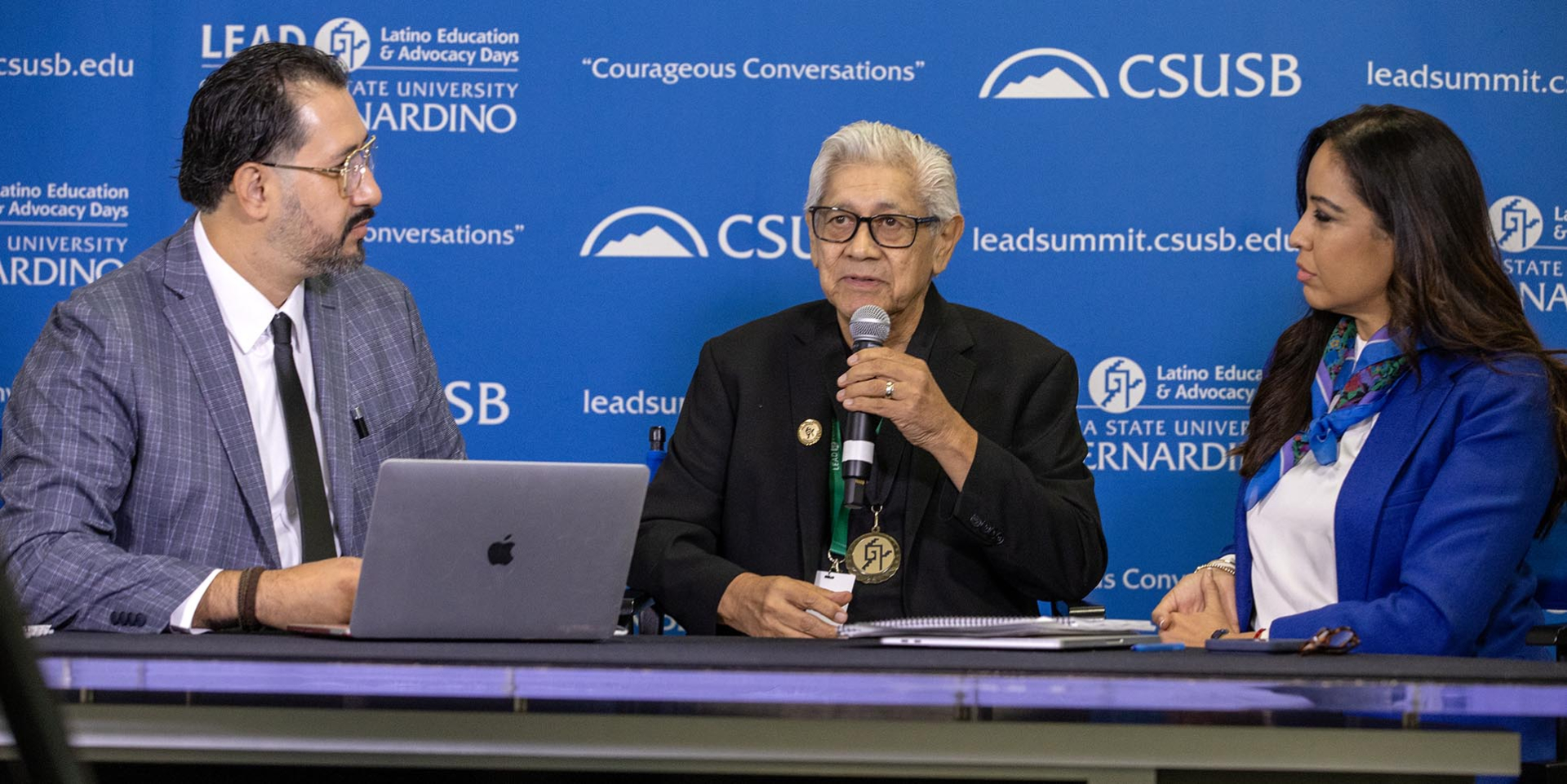Alan Llavore | Office of Marketing and Communications | (909) 537-5007 | allavore@csusb.edu

Jerry Tello, award-winning author, storyteller and clinical psychologist, highlighted a major reason why the LEAD Summit XIV theme, “Telling Our Stories — Our Way, Our Voice: Latino Representation in the Arts, Media, and Education,” was so important.
Speaking during the Tomás Rivera Featured Panel, “La Palabra as Power: Spoken Word, Música, Poetry, Literature, and the Politics of Voice,” at the summit on Oct. 3 at Cal State San Bernardino, Tello once shared with a group of children a story he wrote about a coyote that didn’t want to be a coyote “because nobody praises coyotes,” and it was given the opportunity to be any animal it wanted to be.
The children, fourth graders, were put in the place of the coyote and asked what kind of animal they wanted to be. Answers ranged from an eagle because it could fly high to a bear because it could sleep all it wants. And there was a little girl from Oaxaca with dark skin who raised her hand.
“She said, ‘I want to be white,’” Tello recalled. “I said, ‘Mija, I’m asking you what animal you want to be?’ She said, ‘I want to be white.’ I said, ‘Mija, you want to be white?’ She said, ‘Yeah, because I don’t like my dark skin because I never see in the movies or any place that there’s anybody good like that. And then on the news they talk bad about my people. And when I go with my mom, they always say ugly words about her. Can I be white?’
“I’m telling a story about animals, and the kids speak the truth about what they’re struggling with,” Tello said.

Throughout the daylong summit at the university’s Santos Manuel Student Union South, speakers and panels addressed the importance for the Latino community to tell its own story — collectively as well as individually — to go beyond representation in mass media and to reclaim the narrative of who they are and how they have contributed to the history of the United States. Otherwise, the speakers said, the community runs the risk of its stories being inaccurately told, marginalized or all-together ignored. And that often leads to others defining who they are, rather than Latinos accurately representing themselves and having others see them in that true light.
“Representation matters deeply, especially in education and media, where visibility impacts self-worth, ambition and societal perception,” said Enrique Murillo Jr., executive director of LEAD, in his opening remarks. “Our art and storytelling are powerful tools for resistance, education and social change. As expressions of identity and activism, these forms bridge culture gaps and challenge the dominant narrative of who we are. If we don't tell our own stories, others will. … And they may not get it right. Chances are they won’t get it right.
“True equity requires more than visibility,” Murillo said. “It demands authentic voices, intentional exclusion, and a shared commitment to justice. The charge of this summit this year is very clear. Three things: to interrogate and dismantle erasure, to weave missing histories into curricula, classrooms and public discourse, and to affirm that inclusion and representation uplift us all rather than to compete for space.”
And the sharing of stories – many of them little known, forgotten or just not shared widely – became the centerpiece of the summit.

The morning keynote speaker was Henry “HEN GEE” Garcia, a pioneer and major architect with his brother Eric (aka “Evil E”) of what became known as West Coast hip-hop. One little known item he shared as part of his oral history of West Coast hip-hop was that Murillo (aka “Hen and Em”) was once part of a rap crew with him known as the “Big Blue Crew,” because they all worked at McDonald’s during high school and would DJ at parties in their work uniforms.
Afternoon keynote speaker Wille “Little Willie G” Garcia took the audience down memory lane, recounting growing up in South Central Los Angeles and discovering his gift for singing. He went on to be a legendary Chicano vocalist and songwriter who served as the frontman for the group “Thee Midniters” during the golden age of Chicano rock n’ roll of the 1960s, blending the sounds of R&B, doo-wop, soul, Latin rhythms and British invasion rock.
The summit also took time to recognize and honor its honorary co-chairs, or padrinos de honor, singer José Feliciano and artist Ignacio Gómez, both towering figures in Latino music and art, with the LEAD Medallion of Honor for their contributions. Feliciano was not able to attend, but sent his greetings via a video message.

Panel presentations also focused on the importance of Latinos telling their own stories, which contribute to the richness of the nation, as well as ensuring that their role in American history is included accurately. A morning panel session, “Curriculum Justice: Centering Latino Voices in Education,” examined how Latinos can help ensure the history of their contributions — as well as those of other groups that have been marginalized — are recorded and told accurately. The capstone panel, “Telling Our Stories — Our Way, Our Voice,” emphasized the importance of creating Latino-led efforts in popular media to develop, produce and distribute projects highlighting the Latino experience, rather than waiting on mainstream Hollywood.
During the Tomás Rivera Featured Panel earlier in the day, as Tello shared the story of the coyote to illustrate the power of words, he said the idea of the story was that the coyote wanted to be anything but itself because it didn’t know itself. In the story, Tata Sol (Father Sun) tells the coyote that its dark coat is beautiful. “I give you the sunshine,” Tata Sol said, “because the darker you are, the more I kissed you, the more I blessed you, the more beautiful you are.” And its job is to sing the song La Luna (the moon) gave it when it comes out at night.
And the meaning of that song?
“The meaning of your song is to tell every child, every child is born sacred,” Tello said. “All of you are sacred just the way you are. And the little girl begins to cry. I said, ‘Mija, you are sacred and a blessing just the way you are.’ She says, ‘Thank you, Tio.’”
For more information, visit the LEAD Summit XIV website, as well as the LEAD Education Projects webpage.